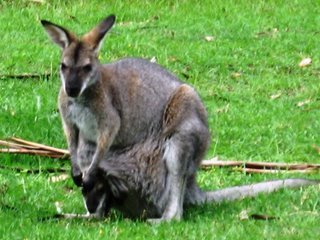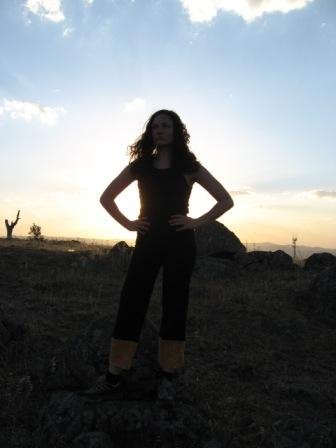Friday, April 13, 2007
Time to leave the nest, kid
Immigration
I've been working at the Australian Department of Immigration and Citizenship (DIAC) * for the past six months which really is poetic justice.
My job relates to the reforms the Department is putting into place after some major scandals in 2005. You see, Australia has a mandatory detention policy. That is, if you are a non-citizen in Australia without a valid visa, the Department is legally required to detain you until 1) you get a valid visa 2) they succeed in removing you from the country. Most of the time this detention takes place in a "detention centre" which is like a prison except you're there for no other crime than existing in a place you're not supposed to physically exist, so they have to be slightly nicer to you, and they plant shrubs to try to hide the barbed wire on the fences.
Australia is an island, large in size but small in population, with this population densely concentrated in urban areas, and we are an ocean away from any of our neighbors. So this policy is actually capable of being largely implemented, unlike the U.S., where the fact that over 10 million illegal immigrants are currently living, building community ties, working, and becoming intrinsic to the economy means that most debates over immigration policy take place in a Dada-esque cloud of surrealness. However public debate in Australia over the fate of 80 asylum-seeking boat arrivals seems to rage with the same furor as the debate over the 10+ million illegals in the States, which maybe points to some mysterious law of political equivalency.
Anyway, the scandals. In 2005 it was discovered that the Department had held an Australian resident, Cornelia Rau, in a detention centre for a year. Ms. Rau was mentally ill and on the run from a cult, so she had lied about her identity, claiming to be a German tourist. However, the Department managed to miss the fact that she spoke fluent Australian-accented English and that her German was at a beginner's level. They also missed the missing person notices put out by the Queensland police with her real name and photo. When Ms. Rau's identity was finally discovered by some family friends, the ensuing shit-storm brought some other scandals to light.
For example, there was the case of Vivian Solon, a woman originally from the Phillipines who'd married an Australian citizen, moved here and naturalized, and divorced him four years later, in part because of her mental illness. She reverted to her maiden name, Alvarez, after the divorce. When she was found half-conscious and wounded after a car crash, police suspected she might be an "unlawful non-citizen." No immigration records were found for "Vivian Alvarez" since her citizenship was listed under "Solon," so the Department proceeded to remove her to the Phillipines. They managed to miss the fact that a search on her first name and her birth date would have brought up her records, as well as the missing person notices put out by her ex-husband. What made the scandal even more scandalous was that Ms. Solon was confined to a wheelchair the whole time, a doctor was pressured into signing a dubious release saying she was healthy enough for her flight, and upon arrival at Manila the official accompanying her dumped the wheelchair with some random nuns, who, taken aback, rolled the dazed woman over to the Qantas counter and left her there. Ms. Solon ended up in a hospice for the indigent, where she remained for four years until the Cornelia Rau scandal gave her ex-husband's efforts to query the Department some traction. Then it turned out that a few Departmental officials had discovered the wrongful removal and covered it up.
So yeah, shit storm all round.
Cue audit reports, independent inquiries, media hullabulloo, insincere, legally careful ministerial apologies, high-level brainstorming sessions on Departmental reform, and a $50,000 order of mouse pads emblazoned with the Department's new logo, "People: our business."**
Among the reforms implemented in the post-Cornelia Rau world has been the creation of "Detention Review Managers" in each State who are supposed to review every single new case of detention and make sure that it seems reasonable and that people with identity concerns are being followed up on. I've been helping to design national policies for the role of these Detention Review Managers - what they check up on, things they must consider, how they work with each other and with the National Office.
Another reform has been the requirement of reports to the Ombudsman's Office on every person in detention for more than two years, basically justifying why they are still there. Yes, some people stay in detention for more than two years - seven years has been the record thus far. So I've been writing some of these 2 year reports, which involves investigating the person's history, medical condition, community links, and often their court cases on their claims to refugee status. And I tell ya, soap operas don't seem so unrealistic to me anymore.
It has been an interesting job, but I'm glad that I will soon be gone. The whole Department needs more than a shakeup, it needs deep institutional therapy. In fact the most interesting thing about working here has been seeing the case study of a dysfunctional organization from the inside.
But maybe that's just a natural result of how unnatural the concept of immigration policy is for human beings, anyway. Just think about it - the very concept of a "passport" has only been around for about a hundred years. (I believe high-level British diplomats used to carry something like it, but it wasn't a universal document.) The concept of requiring every visitor to a country to have a visa is even newer.
Part of the psychological distress of people in detention, I believe, springs from this new and rather alienating idea. The earth's the earth, the sky's the sky, and you can't see a border. When you've lived in a place for a while and you have friends there, you start to get attached to it and to feel like you have a right to exist there, independent of any little black markings on a piece of paper that you own. (I know all about that).
This is most evident in cases of foreign citizens who moved to Australia when they were children, but never changed citizenship. If, as adults, they commit crimes that land them in prison for more than 12 months, the Department of Immigration cancels their visas and attempts to send them back to their "home countries" - where they may have no memories or knowledge of the language or culture.
I wonder if the Aboriginal community in Australia has a case for kicking out all the new people as "unlawful non-citizens"? What a shame that they never thought to create a glorious institution like DIAC or they might have a legal case for it. But then, they too were boat arrivals to this island continent, more than 100,000 years ago, and there definitely weren't any visas around back then.
*The Department recently changed its name from Department of Immigration and Multicultural Affairs (DIMA). Note inclusion of the word "and" in the new acronym to avoid the spelling "DIC" and the resultant "DIC-head" jokes that are now being cracked anyway.
**Then it turned out that the mice used on the Department's computer systems were designed to work on a bare table, not a mouse pad. So the $50,000 order of mouse pads was thrown away.
My job relates to the reforms the Department is putting into place after some major scandals in 2005. You see, Australia has a mandatory detention policy. That is, if you are a non-citizen in Australia without a valid visa, the Department is legally required to detain you until 1) you get a valid visa 2) they succeed in removing you from the country. Most of the time this detention takes place in a "detention centre" which is like a prison except you're there for no other crime than existing in a place you're not supposed to physically exist, so they have to be slightly nicer to you, and they plant shrubs to try to hide the barbed wire on the fences.
Australia is an island, large in size but small in population, with this population densely concentrated in urban areas, and we are an ocean away from any of our neighbors. So this policy is actually capable of being largely implemented, unlike the U.S., where the fact that over 10 million illegal immigrants are currently living, building community ties, working, and becoming intrinsic to the economy means that most debates over immigration policy take place in a Dada-esque cloud of surrealness. However public debate in Australia over the fate of 80 asylum-seeking boat arrivals seems to rage with the same furor as the debate over the 10+ million illegals in the States, which maybe points to some mysterious law of political equivalency.
Anyway, the scandals. In 2005 it was discovered that the Department had held an Australian resident, Cornelia Rau, in a detention centre for a year. Ms. Rau was mentally ill and on the run from a cult, so she had lied about her identity, claiming to be a German tourist. However, the Department managed to miss the fact that she spoke fluent Australian-accented English and that her German was at a beginner's level. They also missed the missing person notices put out by the Queensland police with her real name and photo. When Ms. Rau's identity was finally discovered by some family friends, the ensuing shit-storm brought some other scandals to light.
For example, there was the case of Vivian Solon, a woman originally from the Phillipines who'd married an Australian citizen, moved here and naturalized, and divorced him four years later, in part because of her mental illness. She reverted to her maiden name, Alvarez, after the divorce. When she was found half-conscious and wounded after a car crash, police suspected she might be an "unlawful non-citizen." No immigration records were found for "Vivian Alvarez" since her citizenship was listed under "Solon," so the Department proceeded to remove her to the Phillipines. They managed to miss the fact that a search on her first name and her birth date would have brought up her records, as well as the missing person notices put out by her ex-husband. What made the scandal even more scandalous was that Ms. Solon was confined to a wheelchair the whole time, a doctor was pressured into signing a dubious release saying she was healthy enough for her flight, and upon arrival at Manila the official accompanying her dumped the wheelchair with some random nuns, who, taken aback, rolled the dazed woman over to the Qantas counter and left her there. Ms. Solon ended up in a hospice for the indigent, where she remained for four years until the Cornelia Rau scandal gave her ex-husband's efforts to query the Department some traction. Then it turned out that a few Departmental officials had discovered the wrongful removal and covered it up.
So yeah, shit storm all round.
Cue audit reports, independent inquiries, media hullabulloo, insincere, legally careful ministerial apologies, high-level brainstorming sessions on Departmental reform, and a $50,000 order of mouse pads emblazoned with the Department's new logo, "People: our business."**
Among the reforms implemented in the post-Cornelia Rau world has been the creation of "Detention Review Managers" in each State who are supposed to review every single new case of detention and make sure that it seems reasonable and that people with identity concerns are being followed up on. I've been helping to design national policies for the role of these Detention Review Managers - what they check up on, things they must consider, how they work with each other and with the National Office.
Another reform has been the requirement of reports to the Ombudsman's Office on every person in detention for more than two years, basically justifying why they are still there. Yes, some people stay in detention for more than two years - seven years has been the record thus far. So I've been writing some of these 2 year reports, which involves investigating the person's history, medical condition, community links, and often their court cases on their claims to refugee status. And I tell ya, soap operas don't seem so unrealistic to me anymore.
It has been an interesting job, but I'm glad that I will soon be gone. The whole Department needs more than a shakeup, it needs deep institutional therapy. In fact the most interesting thing about working here has been seeing the case study of a dysfunctional organization from the inside.
But maybe that's just a natural result of how unnatural the concept of immigration policy is for human beings, anyway. Just think about it - the very concept of a "passport" has only been around for about a hundred years. (I believe high-level British diplomats used to carry something like it, but it wasn't a universal document.) The concept of requiring every visitor to a country to have a visa is even newer.
Part of the psychological distress of people in detention, I believe, springs from this new and rather alienating idea. The earth's the earth, the sky's the sky, and you can't see a border. When you've lived in a place for a while and you have friends there, you start to get attached to it and to feel like you have a right to exist there, independent of any little black markings on a piece of paper that you own. (I know all about that).
This is most evident in cases of foreign citizens who moved to Australia when they were children, but never changed citizenship. If, as adults, they commit crimes that land them in prison for more than 12 months, the Department of Immigration cancels their visas and attempts to send them back to their "home countries" - where they may have no memories or knowledge of the language or culture.
I wonder if the Aboriginal community in Australia has a case for kicking out all the new people as "unlawful non-citizens"? What a shame that they never thought to create a glorious institution like DIAC or they might have a legal case for it. But then, they too were boat arrivals to this island continent, more than 100,000 years ago, and there definitely weren't any visas around back then.
*The Department recently changed its name from Department of Immigration and Multicultural Affairs (DIMA). Note inclusion of the word "and" in the new acronym to avoid the spelling "DIC" and the resultant "DIC-head" jokes that are now being cracked anyway.
**Then it turned out that the mice used on the Department's computer systems were designed to work on a bare table, not a mouse pad. So the $50,000 order of mouse pads was thrown away.
Martin cut his hair
Martin's been going through even more changes than me.  Yes, the hair is gone. I cut off the ponytail myself (then he went to the barber.) Should've had Regina Spektor's Samson playing...
Yes, the hair is gone. I cut off the ponytail myself (then he went to the barber.) Should've had Regina Spektor's Samson playing...
M after the chop:

 Yes, the hair is gone. I cut off the ponytail myself (then he went to the barber.) Should've had Regina Spektor's Samson playing...
Yes, the hair is gone. I cut off the ponytail myself (then he went to the barber.) Should've had Regina Spektor's Samson playing...M after the chop:

Garden
"Mary put her hand out of the window and held it in the sun. 'It's warm - warm!' she said. 'It will make the green points push up and up and up, and it will make the bulbs and roots work and struggle with all their might under the earth.' ...She put on her clothes in five minutes. She unchained and unbolted nd unlocked, and when the door was open she sprang across the step with one bound, and there she was standing on the grass, which seemed to have turned green, and with the sun pouring down on her and warm, sweet wafts about her and the fluting and twittering and singing oming from every bush and tree. She clasped her hands for pure joy and looked up in the sky, and it was so blue and pink and pearly and white and flooded with springtime light that she felt as if she must flute and sing aloud herself, and knew that thrushes and robins and skylarks could not possibly help it. She ran around the shrubs and paths towards the secret garden."
--Frances Hodgson Burnett, The Secret Garden
What else have I been doing with myself? Gardening... According to Foucault (Histoire de la Folie, 1967) in the early days of treating the insane separately from criminals, it was very common to have inmates working to grow their own food in vegetable gardens. Touching the earth, watching plants grow, and the connection with the seasons was considered to be the best activity for improving mental health.
It has certainly been good for mine. It's just so cool how you put a seed in the ground and it comes up.
Garden in October:
Garden in November:
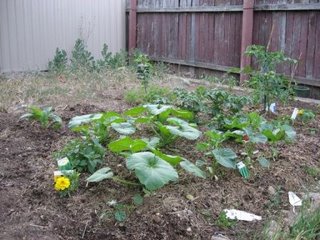
Garden in December:
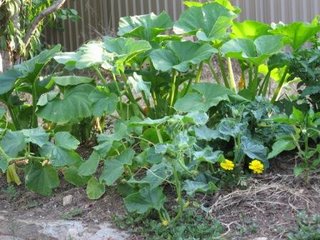
By far the most prolific vegetable has been the button squash. It's like a vegetable kudzu and after a month of yellow squash salad, yellow squash stir-fry, and baked yellow squash, Martin was thoroughly sick of yellow squash. So I started hiding it in pureed soup and mashed potatoes.
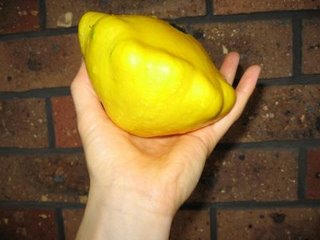
--Frances Hodgson Burnett, The Secret Garden
What else have I been doing with myself? Gardening... According to Foucault (Histoire de la Folie, 1967) in the early days of treating the insane separately from criminals, it was very common to have inmates working to grow their own food in vegetable gardens. Touching the earth, watching plants grow, and the connection with the seasons was considered to be the best activity for improving mental health.
It has certainly been good for mine. It's just so cool how you put a seed in the ground and it comes up.
Garden in October:

Garden in November:

Garden in December:

By far the most prolific vegetable has been the button squash. It's like a vegetable kudzu and after a month of yellow squash salad, yellow squash stir-fry, and baked yellow squash, Martin was thoroughly sick of yellow squash. So I started hiding it in pureed soup and mashed potatoes.


My mum's farm
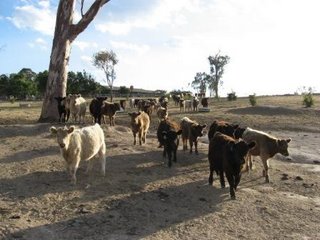
On of the reasons Martin and I moved to Canberra was that my mum lives on the outskirts, on a farm with her husband, Greg. They breed Galloway cattle. It's a lifestyle choice.
The farm house is ranch style, profusely carpeted with large cow skins, and the main wall in the living room is completely covered in hundreds and hundreds of trophy ribbons from cattle shows. (Cows are judged both "on the hoof" and "on the hook" - for carcass meat quality.)
I used to be vegetarian, but now I eat meat occasionally - my particular body type just needs it and I start to feel a bit faded if I haven't had meat for a few weeks. I try to stick to organic, kindly-raised animals (like my mum's cows) but I'm still squeamish and guilty about the idea of eating dead things. And in the yoga community, obviously there are a lot of vegetarians who feel very strongly about it. (I met one girl at a Krishna Das workshop. I mentioned that I was going to stay at my mum's cattle farm and she just gazed at me with her big melting eyes, leaned forward and put her hand on my shoulder, and said "I'm sorry, that must be so hard for you...")

So, there are a lot of confronting things for me about staying at the farm. The cows all have names, and Mum talks to them and feeds them every day and fusses over the adorable calves. A few of the baby boys are saved as bulls, but most are castrated to become steers, and then their names get changed into numbers because their days are numbered. Every month two of the steers get taken to the slaughterhouse where they are killed by a bolt gun through the forehead. Greg always sends two at a time "so that they have a mate" - that way they get less stressed while they are waiting at the slaughterhouse overnight.
A lot of people are disturbed thinking about how their steak used to have a name. Yet is it ethically better to buy a plastic-wrapped hamburger at the supermarket? You don't change the reality of where that meat came from by avoiding thinking about it; that just seems like moral cowardice. It certainly doesn't disturb my mum and Greg; they spend the day affectionately working with the cows and then enthusiastically tuck into large slabs of meat for both lunch and dinner.
I'm not sure how many acres the farm is, but you can walk around the farm in about two hours. There are hills (Big and Small), a creek, several watering holes, and a small, patchy eucalypt forest. The cows usually climb to the top of Big Hill in the evenin
 gs, perhaps for the grazing or perhaps for the sunsets and sunrises. Which are spectacular.
gs, perhaps for the grazing or perhaps for the sunsets and sunrises. Which are spectacular.When Martin and I first moved to Australia we spent a few months living on the farm. The big sky, endless views, and menagerie of animals were quite a shock after our urban lifestyles in DC. Every day we walked around for hours, trying to sneak up on the kangaroos at the watering holes, poking sticks at echidnas in the forest, or feeding carrots to the neurotic ex-racehorse in the Small Hill paddock. (I used to bring a curry-comb and brush the horse, but every time I did, he'd get a gigantic boner and it was just too disturbing.)
The bands of kangaroos hopping about tick off Mum and Greg, because four kangaroos eat as much grass as one cow, and grass is a scarce commodity in the dry climate. Every once in a while, they hire a kangaroo hunter who comes with a shotgun and leaves them lying where they fall.
 By law you're not allowed to use the bodies for meat unless you have a permit - which seems disrespectful as well as wasteful to me; you're stealing their lives without even putting those lives to use. But Mum's dog, Fenris, certainly enjoys finding those rotting kangaroo carcasses; he rolls around in them ecstatically and carries their bones proudly back to the front door.
By law you're not allowed to use the bodies for meat unless you have a permit - which seems disrespectful as well as wasteful to me; you're stealing their lives without even putting those lives to use. But Mum's dog, Fenris, certainly enjoys finding those rotting kangaroo carcasses; he rolls around in them ecstatically and carries their bones proudly back to the front door.Reading back on what I've written, death is a big theme of life on the farm. I haven't even mentioned the cat, Ash, who is a deadly hunter and likes to leave disembowelled possums lying in front of the bathroom door, which really wakes you up in a hurry when you go to the toilet in the morning, let me assure you. Nor have I mentioned the cow skeletons lying around everywhere on the farm, strewn amongst the rocks in various stages of sun-bleach. (When I was in Australia two years ago I thought the cow skulls would make great accessories for modern art projects. It was a terrible, terrible idea but that's a story for another day.)
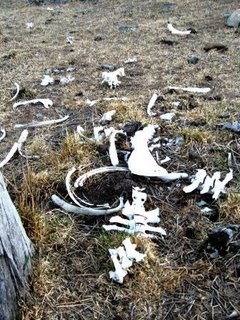
There's a classic Buddhist meditation where you imagine your own body aging, and then you visualize your own corpse rotting away into a skeleton. Part of the idea of this is to reinforce just how mortal and fleeting our lives are - and to remind us how much we should treasure every single living breath. It's an idea most people who've suffered near-death experiences are familiar with.
Thinking about death doesn't make life grim - at least not for me. It's when I get complacent and ungrateful, when I start subconsciously assuming things are going to stay this way forever, that the joy starts to sneak away...
So maybe that's why I have so many vivid memories of my time living on the farm.
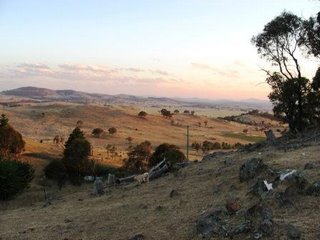
It's a harsh, dry, unforgiving, spectacularly beautiful landscape.
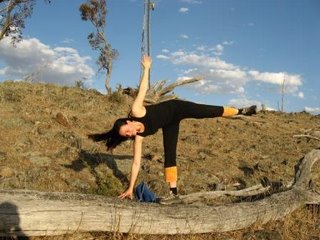
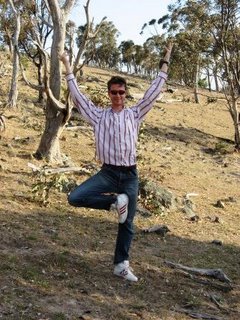
It
